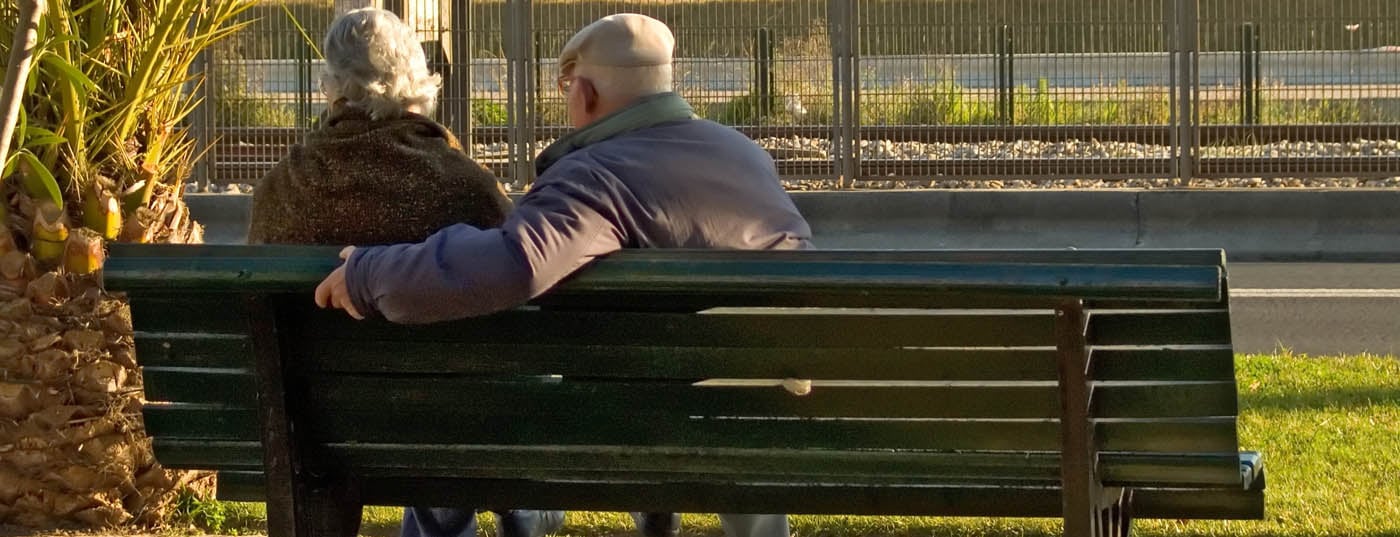As the population in Switzerland ages, even more people will develop cancer at an advanced age in the future. In these patients, treatment decisions are often complex because, due to advanced age, the risk of complications is usually also increased and the benefit of an intervention is lower. On November 22, 2014, an educational event on the topic of “Challenges of geriatric oncology” was held in Zurich, where the special features of oncological treatment of elderly patients were discussed. We report two presentations on prostate cancer and colorectal cancer.
Martin Umbehr, MD, Triemli City Hospital, Zurich, presented epidemiologic data on prostate cancer. Prostate cancer is the most common type of cancer in Switzerland – one in six men will be confronted with it in the course of his life. The incidence has tripled since the 1990s due to screening by PSA testing, but at the same time this has led to a stage shift, so that today 90% of carcinomas are detected at a localized stage. The incidence will continue to increase due to demographic trends.
Prostate cancer: In geriatric patients, less is often more
The biological spectrum of the disease is very broad and includes “harmless” to very aggressive tumors. In clinical practice, the problem is that at the time of diagnosis it is often impossible to say precisely what type of tumor the patient has and how (and whether) the tumor will change over time. Currently, Gleason score remains the best prognostic factor. Curative therapy is possible for localized carcinoma, and the options are active surveillance, prostatectomy, or radiation. “Treatment selection should take into account age, comorbidities and patient preferences,” Dr. Umbehr said. “Especially in geriatric patients, less is often more, and not every patient diagnosed with prostate cancer needs immediate treatment.” Individualized decision making is the big clinical challenge in prostate cancer today.
Active Surveillance and Watchful Waiting
The speaker emphasized the difference between Active Surveillance and Watchful Waiting, as these two terms are often confused or used as synonyms. In Active Surveillance, the physician suspects a low aggressive tumor that can and will be treated curatively. However, due to the low aggressiveness, immediate active treatment is not necessary and the patient is monitored at regular intervals. Active therapy (surgery or radiation) is initiated only in the event of disease progression. Watchful waiting, on the other hand, is a palliative strategy; the goal is not to cure, but to alleviate symptoms when they occur during the course.
There are no international standards for Active Surveillance. In general, control biopsies are mandatory during the course. An initial biopsy should be performed within 3-6 months of diagnosis to reduce the risk of misclassification. Thereafter, regular PSA checks are performed and a biopsy is usually performed once a year. When the results are available, a decision is always made together with the patient as to whether the strategy of Active Surveillance can be maintained. Regular PSA testing for control is not sufficient because the results of this test are too nonspecific.
The data for active surveillance are good: patients who receive delayed curative therapy have equally good outcomes as those treated immediately. Nevertheless, such an approach must be carefully discussed with patients, because a recommendation for a wait-and-see approach to a diagnosis of cancer is understandably surprising for many affected individuals and requires an understanding of the biology of this type of cancer. In addition, with active surveillance there is a small residual risk that the tumor is underestimated in its aggressiveness or that progression during its course remains undetected and the time to initiate curative intervention may be missed. The correct selection of patients is therefore also of utmost importance in Active Surveillance.
Chemotherapies also effective in elderly patients
PD Dr. med. Frank Stenner, University Hospital Basel, informed about special aspects in geriatric patients with metastatic prostate carcinoma. The average age of onset of prostate cancer is 70 years, therefore geriatric aspects of therapy have a high priority. The median age of men who die from prostate cancer is 80 years. However, this age also corresponds to the average life expectancy of men in Switzerland. It is therefore important that the therapy of a prostate carcinoma does not cause more damage than the tumor itself.
10-20% of patients already have metastases (often in the bones) at the time of diagnosis, and 50% of patients with stage T3 disease. Bone metastases have a major impact on survival, as patients with pathological fractures survive less long than patients without fractures. The treatment of patients with metastatic prostate cancer is about prolonging survival, maintaining quality of life and preventing complications – such as pathological fractures. Today, a whole range of medications and measures are available for this purpose. New therapeutic options have significantly improved the outlook in recent years.
The following treatment options are currently available:
- Anti-hormonal therapy: Initially with LHRH agonists/antagonists, bicalutamide or flutamide, in case of castration resistance with abiraterone (Zytiga®), which inhibits androgen synthesis, or enzalutamide (Xtandi®), which prevents androgen binding. Both drugs prolong patient survival, both when used before chemotherapy and after – the optimal sequence of therapy is currently unknown. Both treatment options for castration-resistant prostate cancer also benefit patients over the age of 65.
- radium dichloride (Xofigo®): In patients with castration-resistant prostate cancer and bone metastases, Xofigo® prolongs survival.
- Bisphosphonates, denosumab (Prolia®, Xgeva®): For stabilization of bone metastases.
- Chemotherapy: Chemotherapy is given with palliative intent or, in some patients with high tumor burden, initially. Two substances are available: Docetaxel (Taxotere®) and Cabazitaxel (Jevtana®). It used to be assumed that chemotherapy was only indicated in younger patients. However, trial data show that the survival benefit from chemotherapy is even higher in older patients than in younger ones.
The speaker’s conclusion: “All patients benefit from the new therapy options, even older ones. Therefore, a patient should not be deprived of any of the therapy options just because of age alone. Chemotherapies are often misjudged by lay people as well as experts and offered too rarely.”
Colorectal carcinoma: few evidence-based recommendations for elderly patients
Geriatric aspects in the treatment of colorectal cancer (CRC) were explained by PD Dr. med. Dirk Kienle, Stadtspital Triemli, Zurich. 60% of all patients with CRC are over 70 years old, and 43% of patients are even over 75 years old. Due to the aging of the population, patients over 80 years of age will not be the exception but the rule in the future. There are special problems in elderly patients: reduced organ functions, an increasing number of comorbidities, frequent comedications, and quite a few patients are in poor general condition and/or require nursing care. All of these factors limit treatment tolerance and make it difficult to assess prognosis. For these reasons, patients over 75 years of age and with comorbidities are generally excluded from studies and few evidence-based treatment recommendations exist.
Several surveys indicate that elderly patients with CRC are medically underserved: They are referred less frequently and later to specialists and are less likely to receive full staging, radio- or chemotherapy, or selective tumor surgery. On the other hand, emergency interventions are more frequent in elderly patients, e.g. due to ileus. This underuse contributes to the poorer prognosis of elderly patients with CRC.
“Surgery is the most important therapeutic component in the treatment of CRC, even in elderly patients,” the speaker emphasized. The prognosis of younger patients has improved in recent years due to a reduction in postoperative mortality and the possibility of curative metastatic resections, but this is not true for older patients.
There are several surgical challenges in geriatric patients: more advanced tumor stages, more emergency surgeries, poor preoperative staging, and higher early postoperative mortality (3% in those over 65, 19% in those over 85). Preoperative assessment is important to identify patients at very high risk of early mortality and to convert them to palliative care when appropriate. Malnutrition, which is more common in the elderly, also increases the risk of complications. Studies have shown that nutritional support in the 7-10 days before surgery can reduce postoperative mortality and prevent complications.
Adjuvant therapies for elderly stage III patients.
Adjuvant chemotherapy with 5-fluorouracil or capecitabine also improves disease-free and overall survival in patients older than 70 years, but only about one-third of those older than 70 years receive appropriate therapy at this stage. In a meta-analysis of several trials of adjuvant therapies, toxicities were not significantly increased in elderly patients, so adjuvant therapy is recommended even in elderly patients in good general health. There are virtually no data for patients older than 80 years, so the benefit of adjuvant treatment is not proven here. The addition of oxaliplatin (combination therapy FOLFOX or XELOX), according to the current state of knowledge, provides little additional benefit for patients older than 70 years and does not represent a standard of care.
Rectal cancer: neoadjuvant radiotherapy.
Rectal cancers are often diagnosed at locally advanced stages. Studies on neoadjuvant therapy specifically for older patients are not available, so subgroup analyses from studies with primarily younger patients or registry data must be used. Available studies have shown that preoperative radiotherapy can reduce the number of local recurrences even in patients older than 70 years, and the complication rate was not increased.
A Swedish registry substudy showed that patients over 75 years of age were much less likely to be treated with preoperative radiation, but that the local recurrence rate did not differ in the two age groups. This suggests that the benefit of radiotherapy appears to be decreasing in elderly patients. In summary, for very fit patients up to 75 years of age, neoadjuvant therapy can be performed analogously to younger patients. For the remaining patients, interdisciplinary case-by-case decisions are required, taking into account tumor extension, patient condition, and patient wishes.
Palliative therapies in colorectal cancer
In the palliative situation, quality of life with preservation of independence is most important for most elderly patients, and skepticism about chemotherapy is widespread. But it must be taken into account that old people in good health still have a long life expectancy. In Switzerland, this is around seven years for 80-year-old men and as much as nine years for women. Palliative chemotherapy or radiotherapy can help maintain quality of life and independence as well as improve survival.
Studies indicate that elderly patients without significant limitations may also benefit from more intensive therapies (combination chemotherapy with bevacizumab or cetuximab) and that toxicities are not clustered in this well-selected patient group. However, these study patients do not represent the average patient in medical practice, so the results are not applicable to the majority of patients. There are now some studies available that have been conducted specifically for elderly patients. This showed that combination chemotherapies (FOLFOX, FOLFIRI) are decently tolerated but offer little additional benefit over monotherapy with 5-FU. In contrast, the addition of bevacizumab to capecitabine therapy provided a significant gain in tumor control with little increased toxicity, making this therapy a standard of care for many elderly patients. The benefit of cetuximab treatment in elderly patients with RAS wild-type tumors is currently being evaluated in trials (including in Switzerland).
Source: Interdisciplinary Continuing Education Platform Onco-Geriatrics, November 22, 2014, Zurich.
InFo ONCOLOGY & HEMATOLOGY 2015; 3(1): 32-34.











